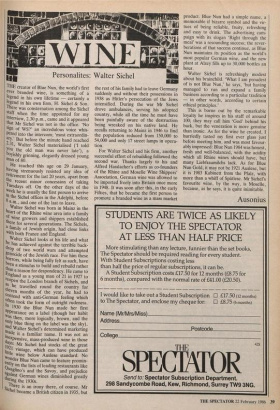Personalites:
111111
Walter Sichel
THE creator of Blue Nun, the world's first ever branded wine, is something of a legend in his own lifetime — certainly a legend in his own firm, H. Sichel & Son. There was consternation among the Sichel staff when the time appointed for my interview, 2.30 p.m., came and it appeared that Mr Sichel was not in the office. 'No sign of WS?' an incredulous voice whis- pered into the intercom; 'most extraordin- ary.' But before the minute hand reached
2.31, Walter Sichel materialised ('I told You the old man was never late'), a boyishly grinning, elegantly dressed young man of 80.
He reached this age on 29 January, having strenuously resisted any idea of retirement for the last 20 years, apart from the recent minor concession of taking Tuesdays off. On the other days of the Week he is usually the first person to arrive in the Sichel offices in the Ade1phi, before 8 a.m., and one of the last to leave.
Walter Sichel was born in Mainz in the heart of the Rhine wine area into a family o f wine growers and shippers established there for several generations. The Sichels, a family of Jewish origin, had close links with both France and England.
, Walter Sichel looks at his life and what he has achieved against the terrible back- drop of two world wars and attempted genocide of the Jewish race. For him these horrors, while being fully felt as such, have than a stimulus to build and rebuild rather (n an a reason for despondency. He came to England as a young man of 21 in 1927 to reopen the London branch of Sichels, and as he travelled round the country for eleven months of the year, he had to Contend with anti-German feeling which often took the form of outright rudeness. '11 1930 the Blue Nun made her first appearance on a label (though her habit Was then, more logically, brown, and the Only blue thing on the label was the sky), and Walter Sichel's determined marketing made it a familiar name. It was not an Inexpensive, mass-produced wine in those days Mr Sichel had stocks of the great ,1.921 vintage, which can have produced little wine below Auslese standard. No Wonder Blue Nun came to feature promin- ently on the lists of leading restaurants like `4naglino's and the Savoy, and prejudice against German wines diminished greatly during the 1930s. There is an irony there, of course. Mr s. tette' became a British citizen in 1935, but
the rest of his family had to leave Germany suddenly and without their possessions in 1938 as Hitler's persecution of the Jews intensified. During the war Mr Sichel drove ambulances, serving his adopted country, while all the time he must have been painfully aware of the destruction being wreaked on his native land. He recalls returning to Mainz in 1946 to find the population reduced from 150,000 to 54,000 and only 17 street lamps in opera- tion.
For Walter Sichel and his firm, another successful effort of rebuilding followed the second war. Thanks largely to his and Alfred Hasslacher's efforts as co-founders of the Rhine and Moselle Wine Shippers' Association, German wine was allowed to be imported freely into Britain once more in 1948. It was soon after this, in the early Fifties, that he became the first person to promote a branded wine as a mass market product. Blue Nun had a simple name, a memorable if bizarre symbol and the vir- tues of being reliable, fruity, refreshing and easy to drink. The advertising cam- paign with its slogan 'Right through the meal' was a resounding success; the rever- berations of that success continue, as Blue Nun maintains its position as the world's most popular German wine, and the new plant at Alzey fills up to 30,000 bottles an hour.
Walter Sichel is refreshingly modest about his brainchild. 'What I am proudest of is not Blue Nun,' he says, 'but having managed to run and expand a family business according to a particular tradition — in other words, according to certain ethical principles.'
This is borne out by the remarkable loyalty he inspires in his staff of around 100; they may call him 'God' behind his back, but the veneration is more genuine than ironic. As for the wine he created, I hurriedly tasted my first ever glass just before meeting him, and was most favour- ably impressed: Blue Nun 1984 was honest, fresh and well-balanced, with the acidity which all Rhine wines should have, but many Liebfraumilchs lack. As for Blue Nun Gold, it may not be 1921 Auslese, but it is 1983 Kabinett from the Pfalz, with more than a whiff of Spatlese. Mr Sichel's favourite wine, by the way, is Moselle, because, as he says, it is quite inimitable.
Ausonius














































 Previous page
Previous page